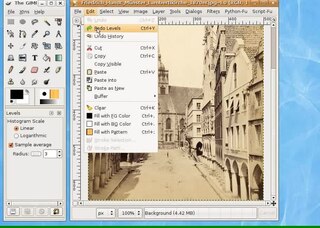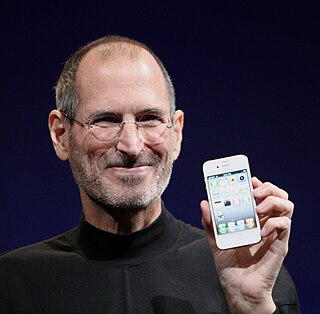
The iPod is a series of portable media players and multi-purpose mobile devices designed and marketed by Apple Inc. The first version was released on October 23, 2001, about 8+1⁄2 months after the Macintosh version of iTunes was released. Apple sold an estimated 450 million iPod products as of 2022. Apple discontinued the iPod product line on May 10, 2022. At over 20 years, the iPod brand is the oldest to be discontinued by Apple.
Ear training or aural skills is a music theory study in which musicians learn to identify pitches, intervals, melody, chords, rhythms, solfeges, and other basic elements of music, solely by hearing. The application of this skill is analogous to taking dictation in written/spoken language. As a process, ear training is in essence the inverse of sight-reading, the latter being analogous to reading a written text aloud without prior opportunity to review the material. Ear training is typically a component of formal musical training and is a fundamental, essential skill required in music schools.
The first-sale doctrine is an American legal concept that limits the rights of an intellectual property owner to control resale of products embodying its intellectual property. The doctrine enables the distribution chain of copyrighted products, library lending, giving, video rentals and secondary markets for copyrighted works. In trademark law, this same doctrine enables reselling of trademarked products after the trademark holder puts the products on the market. In the case of patented products, the doctrine allows resale of patented products without any control from the patent holder. The first sale doctrine does not apply to patented processes, which are instead governed by the patent exhaustion doctrine.

A podcast is a program made available in digital format for download over the Internet. For example, an episodic series of digital audio files that a user can download to a personal device to listen to at a time of their choosing. Podcasts are primarily an audio medium, with some programs offering a supplemental video component. Streaming applications and podcasting services provide a convenient and integrated way to manage a personal consumption queue across many podcast sources and playback devices. There are also podcast search engines, which help users find and share podcast episodes.

Web conferencing is used as an umbrella term for various types of online conferencing and collaborative services including webinars, webcasts, and web meetings. Sometimes it may be used also in the more narrow sense of the peer-level web meeting context, in an attempt to disambiguate it from the other types known as collaborative sessions. The terminology related to these technologies is exact and agreed relying on the standards for web conferencing but specific organizations practices in usage exist to provide also term usage reference.

A screencast is a digital recording of computer screen output, also known as a video screen capture or a screen recording, often containing audio narration. The term screencast compares with the related term screenshot; whereas screenshot generates a single picture of a computer screen, a screencast is essentially a movie of the changes over time that a user sees on a computer screen, that can be enhanced with audio narration and captions.
The multinational technology corporation Apple Inc. has been a participant in various legal proceedings and claims since it began operation and, like its competitors and peers, engages in litigation in its normal course of business for a variety of reasons. In particular, Apple is known for and promotes itself as actively and aggressively enforcing its intellectual property interests. From the 1980s to the present, Apple has been plaintiff or defendant in civil actions in the United States and other countries. Some of these actions have determined significant case law for the information technology industry and many have captured the attention of the public and media. Apple's litigation generally involves intellectual property disputes, but the company has also been a party in lawsuits that include antitrust claims, consumer actions, commercial unfair trade practice suits, defamation claims, and corporate espionage, among other matters.
GoToMyPC is remote desktop software that allows users to access computers remotely using a web browser. It was developed by ExpertCity and launched in 1998. Citrix Systems acquired ExpertCity in 2004 and maintained the GoToMyPC brand and services. Citrix spun off the GoTo products, which were acquired by LogMeIn in early 2017. There are three versions: "Personal", "Pro", and "Corporate".

Reader Rabbit is an educational game franchise created in 1983 by The Learning Company. The series is aimed at children from infancy to the age of nine. In 1998, a spiritual successor series called The ClueFinders was released for older students aged seven to twelve.
Uniloc Corporation is a company founded in Australia in 1992.
Veriato, formerly known as SpectorSoft, is a software company that develops and sells user behavior analytics and employee monitoring software.

The history of the iPhone development by Apple Inc. spans from the early 2000s to about 2010. The first iPhone was released in 2007. By the end of 2009, iPhone models had been released in all major markets.
AiLive Inc. is a software company based in Mountain View, California. The company was co-founded in 2000 by software programmer and developer Wei Yen and by computer engineer Xiaoyuan Tu. The company has worked closely with Nintendo on the development of motion-sensing hardware, tools and software for the Wii video game console.
Melodic Learning is a multimodal learning method that uses the defining elements of singing to facilitate the capture, storage and retrieval of information. Widely recognized examples of Melodic Learning include using the alphabet song to learn the alphabet and This Old Man to learn counting.
An app store is a type of digital distribution platform for computer software called applications, often in a mobile context. Apps provide a specific set of functions which, by definition, do not include the running of the computer itself. Complex software designed for use on a personal computer, for example, may have a related app designed for use on a mobile device. Today apps are normally designed to run on a specific operating system—such as the contemporary iOS, macOS, Windows, Linux or Android—but in the past mobile carriers had their own portals for apps and related media content.

Linspire is a commercial operating system based on Debian and Ubuntu and currently owned by PC/OpenSystems LLC. It had been owned by Linspire. Inc. from 2001 to 2008, and then by Xandros from 2008 to 2017.
Finjan, Inc. v. Secure Computing Corp., 626 F.3d 1197 (2010), was a patent infringement case by the United States Court of Appeals for the Federal Circuit involving "proactive scanning" technology for computer security. The Federal Circuit made a mixed decision after hearing the appeals from both sides. In terms of infringement, the Federal Circuit affirmed Secure Computing's infringement on Finjan's system and storage medium patent claims but reversed the infringement on Finjan's method claim. In terms of damage award, the Federal Circuit not only affirmed the previous $9.18 million award by the United States District Court for the District of Delaware, but also remanded for the district court to assess the extra damages between the post-judgement and pre-injunction period.
Blackboard Inc. was an American educational technology company with corporate headquarters in Reston, VA. It was known for Blackboard Learn, a learning management system. It merged with Anthology in late 2021, with the future name of the combined company not announced yet.

Fresh Patch LLC is an e-commerce company that delivers hydroponically grown grass patches to pet owners within the United States. The ABC television network featured Fresh Patch on its show Shark Tank.
Zaark and the Night Team is a 1995 series of two multimedia educational CD-ROMs subtitled: The Quest for Patterns and The Search for Symbols. It was developed by EduConcept and published by Maxis as part of their brand Software Toys For Kids.








